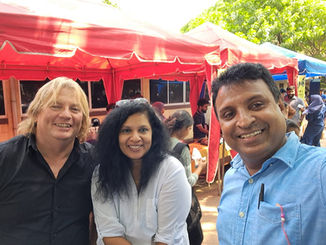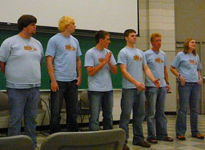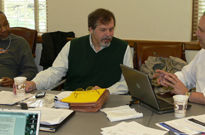About AMSA

The purpose of the American Men’s Studies Association (AMSA) is to develop the critical studies of men and masculinities globally through the advancement of feminist-informed scholarship. AMSA’s goal is to provide a forum for teachers, researchers, students, artists, and practitioners to collaborate and support one another in a mutually empowering environment.
Our Mission
The purpose of the American Men’s Studies Association (AMSA) is to develop critical studies of men and masculinities globally through the advancement of feminist-informed scholarship. AMSA’s goal is to provide a forum for teachers, researchers, students, artists, and practitioners to collaborate and support one another in a mutually empowering environment. These values are reflected in its conferences, its scholarship, and its members, and are characterized by the inclusiveness of those who are historically underrepresented and ethical behavior in high-quality research, publication, teaching, and practice.

Our Values
1. Supports and encourages research by scholars considering the complexities of gender, including minority, first-generation, people with disabilities, and other scholars who are members of historically oppressed groups and affirms the integration of academia with activism, clinical practice, and art.
2. Asserts the importance of both discipline-specific and interdisciplinary approaches to critical analyses of men and masculinities.
3. Encourages student development through participation and membership, offering scholarship and mentoring opportunities for young scholars in the field.
4. Seeks the participation and membership of all individuals irrespective of gender identity, race, class, ethnicity, sexual orientation, physical abilities, nationality, or religious identity.
5. Is committed to social justice struggles for historically oppressed groups.
6. Affirms its commitment to feminist-informed policies, politics, and practices.
Membership within the American Men’s Studies Association means that you are a part of advancing the critical study of men and masculinities by encouraging the development of teaching, research, and clinical practice in the field of men’s studies. AMSA provides a forum for teachers, researchers, students, and practitioners to exchange information and to gain support for work on men and masculinities.
Leadership
The Story of AMSA
Founded in 1991, the American Men’s Studies Association (AMSA) grew out of a movement of scholars in the early 1980s who sought to explore men and masculinities as gendered experiences. What began as a small academic network soon became a national organization committed to open, critical, and inclusive scholarship about men’s lives.
An organization born from a movement to study men as gendered beings and transform understanding of masculinities.
Early Roots:
The Men’s Studies Task Group
In 1982, a group of pioneering scholars including Martin Acker, Shepherd Bliss, Harry Brod, Sam Femiano, Martin Fiebert, and Mike Messner formed the Men’s Studies Task Group (MSTG) within the National Organization for Men (NOM). The group produced the Men’s Studies Newsletter and organized workshops at the annual Men and Masculinity Conferences, offering a new academic space for conversations about gender, identity, and men’s roles in society.
Growth and Formation of the Men’s Studies Association
By the mid-1980s, the MSTG had become one of NOM’s most active groups. In 1989, it organized its first Interdisciplinary Men’s Studies Conference at Chatham College in Pittsburgh, followed by another in Atlanta in 1990. These gatherings drew scholars from across North America and Europe and signaled the growing academic legitimacy of men’s studies.
Independence and the Birth of AMSA
As participation expanded, leaders recognized the need for an independent academic home. In 1991, the group incorporated as the American Men’s Studies Association (AMSA). Founders Sam Femiano, James Doyle, Martin Acker, Stephen Boyd, Charles Miley, and David Robinson drafted AMSA’s first mission statement, emphasizing an ethical and pluralistic approach that rejected all forms of oppression, including sexism, racism, and homophobia, while welcoming diverse perspectives within men’s studies.
Building the Field
Despite early conflicts with NOMAS leadership, AMSA quickly established itself as the central hub for men’s studies scholarship. Through annual conferences, publications, and online networks, the association fostered research on masculinity across disciplines such as literature, history, religion, and psychology. Over time, AMSA’s conferences became known for their intergenerational and interdisciplinary energy, uniting senior scholars and new voices in the field.
Looking Back
and Ahead
AMSA’s founders saw their work as part of a larger academic and social transformation: recognizing men as gendered beings and exploring the implications of that understanding. Today, AMSA continues that legacy—maintaining an open, inclusive space for dialogue and advancing men’s studies as a vital part of the academy. As we look toward the future, AMSA remains committed to expanding scholarship, supporting new generations of researchers, and deepening the study of men and masculinities to better understand our shared human experience.
























